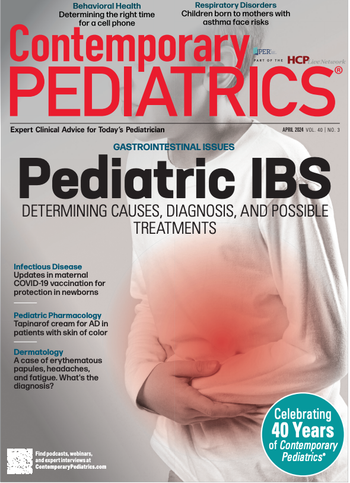
Get caught up with our journal! Review some of the top stories from the Contemporary Pediatrics website over the last week, and catch up on anything you may have missed.

Get caught up with our journal! Review some of the top stories from the Contemporary Pediatrics website over the last week, and catch up on anything you may have missed.

Allison Scott, DNP, CPNP-PC, IBCLC, reviews the updated breastfeeding guidelines from the American Academy of Pediatrics.

Juanita Mora, MD, breaks down the FDA approval of benralizumab as an add-on maintenance therapy among patients with severe asthma aged 6 to 11 years.

The FDA approval of benralizumab for patients ages 6 to 11 with asthma follows the conclusions of the phase 3 TATE study.

The CDC's take on the importance of HIV awareness and testing among our youth.

April 10, 2024 is National Youth HIV & AIDS Awareness Day.

When deciding whether to keep their child home from school, 4% of parents contacted a health care provider for advice.

A recently published study in JAMA sought to determine if there is a link between acetaminophen use during pregnancy and children’s risk of developing autism, ADHD, or intellectual disabilities.

"Our findings provide evidence for a direct association between maternal smoking during pregnancy and wheeze occurrence," wrote the authors.

A study on Italian vaccination rates and factors influencing Rotavirus vaccine acceptance.

The treatment is approved for adolescents aged 12 years and older.

A young woman with no significant past medical history returns from hiking with several white-spotted ticks and experiences erythematous papules, rashes, headaches, and fatigue. What’s the diagnosis?

Get caught up with our journal! Review some of the top stories from the Contemporary Pediatrics website over the last week, and catch up on anything you may have missed.

Natasha Hoyte, MPH, CPNP-PC, explains how important PrEP and PEP in school health programs can be for youth, and the crucial role awareness plays.

Lauren Flagg, DNP, APRN, CPNP-AC, discusses severe refractory status asthmaticus based on a session presented at the NAPNAP National Conference.

Of the 600,238 bivalent vaccine doses administered by all providers in the study period, 35,114 (5.9%) were done so by FRPP partners.

HCPs can provide resources to help parents make an informed decision.

Latest guidelines, treatments, and when to refer to a specialist.

The pediatric approval to treat CABP is 1 of 3 indications approved by the FDA.

The single-arm study has an estimated enrollment of 93 participants, made up of females aged 2 to 8 years and males aged 2 to 9 years with CPP.

The phase 3 portion of the AMPLITUDE trial will include adolescents aged 10 to 17 years.

The planned phase 1/2 INSPIRE Duchenne trial (NCT06138639) is a first in-human, open-label, multicenter trial to evaluate tolerability and safety of SGT-003.

Chris Kyper, DNP, CPNP-AC/PC, breaks down characteristics of Heparin-induced thrombocytopenia, an uncommon adverse reaction to heparin.

New data demonstrates protection against new variants.

A discussion of human trafficking awareness and what primary care providers can do to spot red flags and implement evidence-based knowledge.

Editor-in-chief Tina Tan, MD, FAAP, FIDSA, FPIDS, highlights the April 2024 issue of Contemporary Pediatrics.

Get caught up with our journal! Review some of the top stories from the Contemporary Pediatrics website over the last week, and catch up on anything you may have missed.

NeuroStar Advanced Therapy becomes the first and only transcranial magnetic stimulation therapy cleared by the FDA as an adjunct treatment for patients 15 years and up with depression.

If approved, govorestat would be the first medication indicated for the treatment of galactosemia, a rare genetic metabolic disease resulting in an inability to metabolize simple sugar galactose.

Tenofovir alafenamide was approved in 2022 to treat pediatric patients aged 12 years and older.